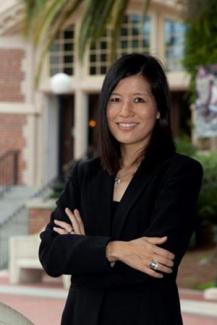Lisa Ryoko Wakamiya

Contact Information
Mon. 4:50-5:50 p.m., Wed. 4:20-5:20 p.m. and by appointment; Office hours are held in person on the benches between DIF and WMS this semester
Courtesy Associate Professor of English
Lisa Ryoko Wakamiya (Ph.D., Slavic Languages and Literatures, University of California, Los Angeles) is Associate Professor of Slavic in the department and Courtesy Associate Professor of English. She is the Coordinator and Graduate Advisor for the Slavic Program.
Her current book project Collecting Objects, Materializing Ethics investigates the relationship between collections of material objects and narrative. Professor Wakamiya’s research has been supported by a Senior Fellowship at the Davis Center for Russian and Eurasian Studies at Harvard University, the Deutscher Akademischer Austauschdienst and the Fulbright U.S. Scholar Program.
For her teaching, Prof. Wakamiya has been recognized with an FSU Undergraduate Teaching Award.
Research Interests
20th- and 21st-century Russian literature and culture
Exile and emigration
Transnationalism
Critical Theory
Material Approaches to Narrative and Culture
Courses Taught
Translation Theory and Practice
Critical Approaches to Vladimir Nabokov
Transnational Literature
Contemporary Russian Cinema
Survey of Russian Literature (in Russian)
The Slavic Vampire
Selected Publications
- “The Worlds Women Collect.” In: Feminism and World Literature. Ed. Robin Truth Goodman. New York: Bloomsbury. [In production. Projected publication Spring 2022]
- “Resisting Humbert's Rhetorical Appeals: A Reevaluation of Lolita's Ethics.” In Teaching Nabokov's Lolita in the #MeToo Era. Ed. Elena Rakhimova-Sommers. Rowman and Littlefield, 2021. pp. 151-165.
- “Tarkovsky and Zvyagintsev: Influence, Depersonalization, Autonomy.” ReFocus: The Films of Andrei Tarkovsky. Ed. Sergei Toymentsev. University of Edinburgh, 2020. pp. 242-256.
- “Tell Me Your Story: Contemporary Russian-American Literature.” In: Global Russian Cultures. Ed. Kevin M.F. Platt. Madison: University of Wisconsin Press, 2019. pp. 135-150.
- “Writer-Collectors: Mimesis and Transmissibility in Nabokov and Benjamin.” In American Contributions to the XVI International Congress of Slavists. Slavica, 2018. pp. 205-216.
- A Late Soviet and Post-Soviet Reader. Co-edited with Mark Lipovetsky. Boston: Academic Studies Press. Vol. 1, 2014; Vol. 2, 2015.
- “Vladimir Sorokin's Abject Bodies: Clones and the Crisis of Subjecthood.” Vladimir Sorokin's Languages: Mediality, Interculturality, Translation. Eds. Tine Roesen and Dirk Uffelmann. University of Bergen, 2013. 231-245
- “Post-Soviet Contexts and Trauma Studies.” Slavonica, Vol. 17 No. 2, November, 2011, 135-45.
- “Ritoricheskie konstruktsii repatriatsii v proizvedeniiakh Aleksandra Solzhenitsyna” (Rhetorical Constructions of Repatriation in the Work of Aleksandr Solzhenitsyn). Novoe literaturnoe obozrenie. Vol. 103 (2010). 232-245.
- Locating Exiled Writers in Contemporary Russian Literature: Exiles at Home. New York: Palgrave Macmillan. 2009.
- "Humbert's 'Gendered' Appeals to the Jury of Not His Peers," Approaches to Teaching Vladimir Nabokov's 'Lolita'. Galya Diment and Zoran Kuzmanovich, eds. New York: Modern Languages Association, 2008. 141-146.
- “On Vasilii Aksenov's Translation of E.L. Doctorow's Ragtime,” Festschrift for Michael Henry Heim. Eds. Craig Cravens, Masako Ueda Fidler, Susan Kresin. Bloomington: Slavica Publishers at Indiana University, 2008. 291-298.
- "Literature and Cultural Institutions by and for Soviet and Post-Soviet Youth," Soviet and Post-Soviet Childrens' Literature and Culture. Eds. Marina Balina and Larissa Rudova. New York: Routledge, 2007. 113-127.
